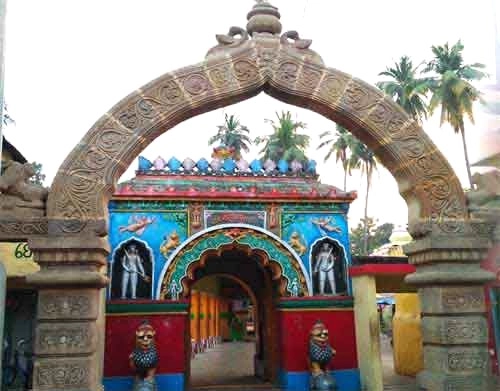
Table of Contents
Tucked away in the culturally rich town of Banapur, the Bhagabati Temple is more than just a sacred site—it’s a living symbol of Odisha’s spiritual strength, artistic heritage, and age-old traditions. Whether you’re a spiritual seeker, a history enthusiast, or a lover of Indian temple architecture, this temple has something special to offer.
So, if you’ve been curious about the Bhagabati Temple in Banapur, Maa Bhagabati herself, or are planning a spiritual trip in Odisha—this blog is your complete guide.
The Spiritual Core of Banapur
The Bhagabati Temple is one of the most revered Shakti Peethas in Odisha. Devoted to Maa Bhagabati, a fierce incarnation of Goddess Durga, the temple exudes a powerful spiritual aura that draws devotees from across the state and beyond.
Local legend says that the goddess emerged from an adjacent lake, captivating the villagers with her divine presence. Over time, she became the soul of Banapur, a town believed to have been ruled by the legendary demon king Banasura—hence the name “Banapur.”
But what makes this temple truly captivating is the blend of faith, folklore, and heritage it stands upon.
A Peek into the Past
Historically, Banapur was once the capital of the Sailodhvaba dynasty, known for building many of Bhubaneswar’s early temples. The site is also linked to Vajrayana Buddhism, as many Buddhist artifacts were unearthed here—making it a fascinating crossroad of spiritual traditions.
Though the temple’s exact origin is debated, its architectural style indicates that it was likely built during the Eastern Ganga dynasty, around the 13th century. According to regional folklore and temple records, the current temple structure, including its Jagamohana (assembly hall), was constructed under the patronage of the Gajapati Maharaja of Puri.
Also, the Bhagabati Temple is mentioned in Sarala Dasa’s Oriya Mahabharata, solidifying its status as one of the twelve prominent Shakti Peethas of Odisha.
A Temple Built with Artistic Grace
The temple is a magnificent example of Kalinga-style architecture, known for its Pidha-style pyramid roofs, sculptural brilliance, and symmetrical designs. The temple walls are richly adorned with:
- Floral motifs
- Mythological carvings
- Sculptures of Ganesha, Kartikeya, Parvati (Bhubaneswari), and Chamunda
Celebrations That Bring the Temple Alive
To begin with, festivals at the Bhagabati Temple Banapur reflect grandeur at its finest. Among them, Durga Puja (Dussehra) stands out as the most awaited and widely celebrated occasion.
Notably, during Sodasha Puja—which directly precedes Dussehra—the priests continue to perform a rare symbolic ritual that thoughtfully replaces the ancient human sacrifice. As a result, thousands of devotees arrive during Ashtami, Navami, and Dashami to witness the goddess worshipped in her fiercest and most powerful form.
Daily Ritual Timings:
- 5:00 AM – Priests begin with Majana (Deity’s holy bath)
- 6:00 AM – They then offer Ballava bhoga
- 8:30 AM – Following that, the temple opens to devotees
- 12:00 PM – Devotees receive Khechudi Dhoopa (Midday offering)
- 1:00 PM – Shortly after, priests conduct Sankhudi Puja
- 2:00–3:00 PM – During this time, the temple closes for Pahuda (Deity’s rest)
- 4:30 PM – In the evening, priests perform Maathapuli Puja (offering)
- Temple Hours: 5:00 AM – 2:00 PM & 3:00 PM – 9:00 PM
Beyond the Temple Walls
Interestingly, your journey doesn’t end at the temple gate. In fact, the surrounding town of Banapur offers a refreshing combination of spirituality and scenic beauty.
- Chilika Lake, for instance, lies just nearby and adds a peaceful retreat for nature lovers.
- Meanwhile, the nearby Ghantasila Hills provide great views and short hikes for those who seek adventure.
- Additionally, don’t miss tasting Mathapuli, a traditional sweet, and exploring local cane crafts—both of which define Banapur’s cultural charm.
FAQs about Bhagabati Temple
1. Who is the goddess of Bhagabati Temple?
The presiding deity is Maa Bhagabati, a fierce eight-armed form of Durga, known for slaying the buffalo demon Mahishasura.
2. Why is Bhagabati Temple famous?
Devotees celebrate it as one of Odisha’s 12 Shakti Peethas for its spiritual energy, historical importance, and artistic architecture.
3. Where is the Bhagabati Temple located?
The temple is situated in Banapur, a town in Khordha district, near the famous Chilika Lake in Odisha.
4. When is the best time to visit Bhagabati Temple?
Durga Puja (September–October) is the best time for festive experiences, though the temple is open all year round.
5. How can I reach Banapur Bhagabati Temple?
Roads connect Banapur well. Travelers can reach the nearest railway station at Balugaon, and fly into the nearest airport at Bhubaneswar (about 100 km away).
Why You Must Visit the Bhagabati Temple
Truly, a visit to the Bhagabati Temple isn’t just about rituals—it’s about immersing yourself in a deep spiritual legacy. With its mythical origins, artistic excellence, and vibrant cultural pulse, the temple indeed offers a fulfilling experience for every soul.
Whether you come seeking blessings or simply want to explore the soul of Odisha, moreover, Maa Bhagabati’s divine presence will stay with you long after you leave.
So, why wait? Moreover, add the Bhagabati Temple Banapur to your Odisha itinerary and feel the divine connection in the heart of history, nature, and faith. In the meantime, tag a friend, share the post, and get ready for your next spiritual adventure in Odisha!

Pingback: varahi Temple, Chaurasi: A Hidden Tantric-Vaishnav Gem in Odisha
Pingback: Cuttack Chandi Temple – History, Rituals & Festivals